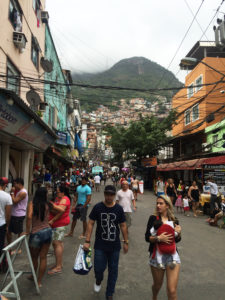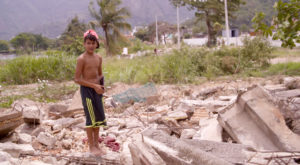(THIS ARTICLE IS MACHINE TRANSLATED by Google from Norwegian)
The millionth city of Rio de Janeiro has a clearly defined "west edge". Here you will find Copacabana and Ipanema, known for their beautiful beaches. However, the strange and peculiar feature of the city is that there are favelas – poor neighborhoods – closest to the backyard of the area's expensive and strictly guarded luxury high-rise buildings.
The first time Einar Braathen and I visited Rio in 1983, we met Benedita da Silva in one of Copacabana's favelas. She was the leader of Brazil's new hope for the future, the Labor Party Partido dos Trabalhadores (PT) .We had magnificent views ahead of us, and our friends could not understand for their lives that someone would pay millions for an apartment down there when they could live here on the mountain side almost free! In 1983, Brazil was still a military dictatorship. Benedita later became the first colored woman to occupy positions as senator, governor and minister in a democratized Brazil. She became social minister in the first government of Luiz Inácio Lula in 2003.
Now NPT's long reign seems to be nearing the end. President Dilma Rousseff is unpopular in all camps. First, due to the largest corruption revelation in the country's history, linked to the state oil company Petrobras. Rousseff is not involved, but she is assigned political responsibility. Second, because the country is experiencing economic decline. Rousseff's government is making brutal cuts to the state budget.
We have lived in the city for several months at a time, for example in 2014 to make the film Yellow card for Fifa. Then there were close demonstrations against the World Cup. They protested against corruption, the use of money in football arenas and improvements in the rich districts rather than the focus on better education, transport and health for most people.
At the end of 2015, we came here again to work on our next documentary, which will be about the Olympic ideals. More specifically, we will examine the relationship between the Olympic ideals and the reality of the host cities.
 We were one very small delegation that installed us on Copacabana: researcher, writer and producer Einar Braathen, photographer Audun Selsjord Bratlie, snowboard driver Isak Ulstein and me, who are film directors. Isak is the main character in our film because he represents Norway in snowboarding in the Youth Olympics, which is being held in Lillehammer these days. Our plan is to compare the Youth Olympics in Lillehammer with the Summer Olympics in Rio de Janeiro.
We were one very small delegation that installed us on Copacabana: researcher, writer and producer Einar Braathen, photographer Audun Selsjord Bratlie, snowboard driver Isak Ulstein and me, who are film directors. Isak is the main character in our film because he represents Norway in snowboarding in the Youth Olympics, which is being held in Lillehammer these days. Our plan is to compare the Youth Olympics in Lillehammer with the Summer Olympics in Rio de Janeiro.
In his time, Baron Pierre de Coubertin propelled modern Olympic games based on lofty ideals, embodied in the Olympic Charter, among others. The joy of achievement, exertion and peaceful strife must be mixed with the formation and respect of common, fundamental ethical principles. International sports competitions should prevent conflict between nations and create peace. "The most important thing is not winning, but participating."
These modern thoughts are contrary to the ideals of ancient Greece: when the Olympic Games were about winning or disappearing. The winners received everything – glory and wealth – while the losers were disgraced.
But I suppose the modern ideals still true? Is it not in our day the winners get everything and the losers disappear? The narrative from the Olympic host cities is about corruption and costs for displaced people. Rio is no exception to this tale. It is now six months for the Olympics to be held in Rio de Janeiro (5-21 August 2016). The whole city is on its head, and traffic is even worse than before because there is construction work everywhere. Houses are demolished, roads are being built. A separate bus route directly from the airport to the Olympic Park in the new Barra de Tijuca district is almost completed and already in use.
After six days in Rio, we ask Isaac what he thinks of the upcoming summer Olympics. He replies: "Brazil has invested in very good sports facilities. I'm impressed and it's cool with the Olympics. But the price is high when so many have to suffer for it. Brazil really needs to invest more in school and such, so it is probably not only positive to have the Rio Olympics. ”
When Isak tells this to the camera, he has ridden a motorcycle in the favela Rocinha, and seen the fantastic (and secret) view from the top of the favela. He has experienced what it is like to be able to breathe freely on Copacabana or Ipanema with fresh sea air, long, white, open beaches and mostly white, nicely dressed people walking along wide sidewalks. This is an almost intoxicating feeling when coming from a noisy favela like Rocinha. Here, at least 100 people live in a relatively small area. The Rocinha district is picturesque where it winds its way up the hillside, and it is easy to understand the origin of the word that describes these neighborhoods: "Favela" is a creeper that grows in northeastern Brazil. But it is incredibly noisy in dense alleys where theft-connected power lines hang visibly, low and dangerously between the houses.
What made the most impact on us, however, was the misery we witnessed right at the giant Olympic Park. First we lost our mouths and gauge how gigantic the plants are, before we became tearful in the face of the ruins of the small village of Vila Autódromo.
Vila Autódromos is located in the beach area next to the Olympic Park, right on a large lake. The first houses here were built by fishermen. Almost 50 years ago, a racetrack was built here, and construction workers settled among the fishermen. Until last year, the idyllic small house was located by the lake. The residents of Vila Autódromo have struggled to keep the houses and the environment they have built themselves. They have legal joints for houses and property. Therefore, it has not been as easy to move them as residents elsewhere. In our previous movie Yellow card for Fifa we presented some areas where residents were thrown onto the street without any compensation.
The special thing about Vila Autódromo is that the houses are built on some interior fillets of some plots – plots that large contractors have been searching for for 20 years. But it is only with the Olympics that they have succeeded. One of the reasons is that the financing of the Olympic Park and the Olympic facilities is a splice between public and private investors. Private contractors build the facilities against receiving the plots for free afterwards. The intention is to demolish most of the sports facilities, and then to build high-rise buildings with luxury apartments. The developers will make billions of dollars.
 The Olympic facilities are so to speak, but the biggest entrepreneurs and some politicians are currently in prison because of the aforementioned corruption scandal with Petrobras. The contracting companies are threatened with bankruptcy. For a while, there was therefore uncertainty as to whether the plants would be completed. The municipality has taken extra steps, and it turns out that the facilities are being completed. Idyllic Vila Autódromo becomes history, perhaps with some small single houses left.
The Olympic facilities are so to speak, but the biggest entrepreneurs and some politicians are currently in prison because of the aforementioned corruption scandal with Petrobras. The contracting companies are threatened with bankruptcy. For a while, there was therefore uncertainty as to whether the plants would be completed. The municipality has taken extra steps, and it turns out that the facilities are being completed. Idyllic Vila Autódromo becomes history, perhaps with some small single houses left.
We meet Fabricio at the age of 12, who is crying in the ruins of the family's house. It was demolished just hours before we arrived.
Many have not been able to say no to relatively high compensation amounts and replacement housing a good distance from the city center. Now perhaps 40 of the original 600 houses remain.
We meet Fabricio at the age of 12, who is crying in the ruins of the family's house. It was demolished just hours before we arrived. "Everything's gone," Fabricio cries, "all my clothes, and my big brother's going out tomorrow, but his papers are under the rocks. Mom had just bought a new fridge. The police have taken it. All because of that. " He points to the huge media building in the Olympic Park, which casts long shadows over Vila Autódromos. "I don't like the rich!" He cries.
We also visited the Navy's main base where the city's only professional team in women's soccer coaches. Brazil has been a military dictatorship. That the military controls the sport, Isaac thought it was nice. But the offer means a way out of poverty for those who have the opportunity to become a professional player.
Isaac also met Geovanah Schuchman Ribeiro, goalkeeper for Karanba. They became friends despite the language barrier. Karanba is run by former Lightning player Tommy A. Nilsen in one of Rio's poorest neighborhoods. In addition to training in football, children receive English lessons and homework help. As a 25-year-old, Tommy suffered a knee injury that ended his career as a pro football player. He went to Brazil on vacation, fell in love with the culture and the people, and met his current wife. But he is skeptical of Brazilians' short-term thinking about welfare and planning of the major sporting events. A few are enriched, and most people become poorer and receive poorer public services. He brings with him his Norwegian values and does what he can for children and young people in one of Rio's poorest and most criminal suburbs. He has great faith that Geovanah can become a professional one day.
 To get one nuanced picture, we sought out the Olympic organizers, and got their version of the benefits of the Olympics. They could tell that the city will have a completely new transport system, a number of state-of-the-art sports facilities, new residential areas and a new growth center around the Olympic Park. We asked the same questions to the critics, and got their version: Only the city's middle-class areas get better transport services. More than 50 families have been displaced from their homes due to various construction projects, which would not have been accepted if the Olympics were not the reason. Housing prices in areas close to the city center have risen, so that the poor are being forced to live far out in the periphery.
To get one nuanced picture, we sought out the Olympic organizers, and got their version of the benefits of the Olympics. They could tell that the city will have a completely new transport system, a number of state-of-the-art sports facilities, new residential areas and a new growth center around the Olympic Park. We asked the same questions to the critics, and got their version: Only the city's middle-class areas get better transport services. More than 50 families have been displaced from their homes due to various construction projects, which would not have been accepted if the Olympics were not the reason. Housing prices in areas close to the city center have risen, so that the poor are being forced to live far out in the periphery.
So what makes me want to travel to Rio time and time again, and not just for critical documentaries? I understand Tommy. I too have fallen in love with the culture and the friendly people. "You can be killed in Rio de Janeiro," one of my dear Brazilian friends told me, "but you will smile." And it's nice to be a place where you simply have eye contact with people who reciprocate smiles.


